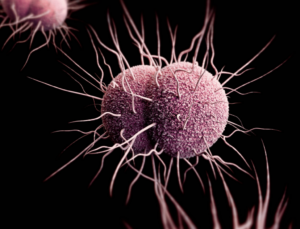The National Institute of Allergy and Infectious Diseases has awarded UNC’s Marcia Hobbs, PhD, and Alex Duncan, MD, PhD, joint Professor in Pharmacology, a five-year, $3.9 million grant to study how a new vaccine to prevent life-threatening Neisseria meningitidis infections may also protect people from Neisseria gonorrhoeae, a sexually transmitted bacterial infection.

Normally, vaccine prevention trials require thousands of participants to test their effectiveness against naturally acquired infection, but Hobbs and Duncan’s trial can test the effectiveness of a vaccine against gonorrhea with less than 200 participants by relying on a study design known as a controlled human infection model, or CHIM. Such trials operate under strict ethical standards, with participants volunteering to be infected with the bacteria under controlled conditions.
“Developing vaccines for three sexually transmitted diseases — gonorrhea, chlamydia, and syphilis – is a major research focus for the National Institutes of Health because of surging cases of the three diseases in recent years. “One of the primary impediments to finding vaccines to prevent these infections is the fact that we don’t understand the types of immune responses that actually prevent these infections,” Hobbs says. “Humans generally fail to develop immunity after being naturally infected.”

“We expect that the vaccine will only provide partial protection,” says Duncan. “Because the vaccine was developed to fight the related meningitis bacteria, it won’t be 95 percent effective in preventing gonorrhea. But if we see protection in 25 or 30 percent of our participants, we can learn about the immune responses that are responsible for protection. Our results can feed forward into basic vaccine development to learn how to make a better vaccine to prevent N. gonorrhoeae infection. It will be a home run if we get to the point where we can say, this MenB vaccine protects some people, but now we know what kind of immune response is needed to make a highly effective gonorrhea vaccine.”
